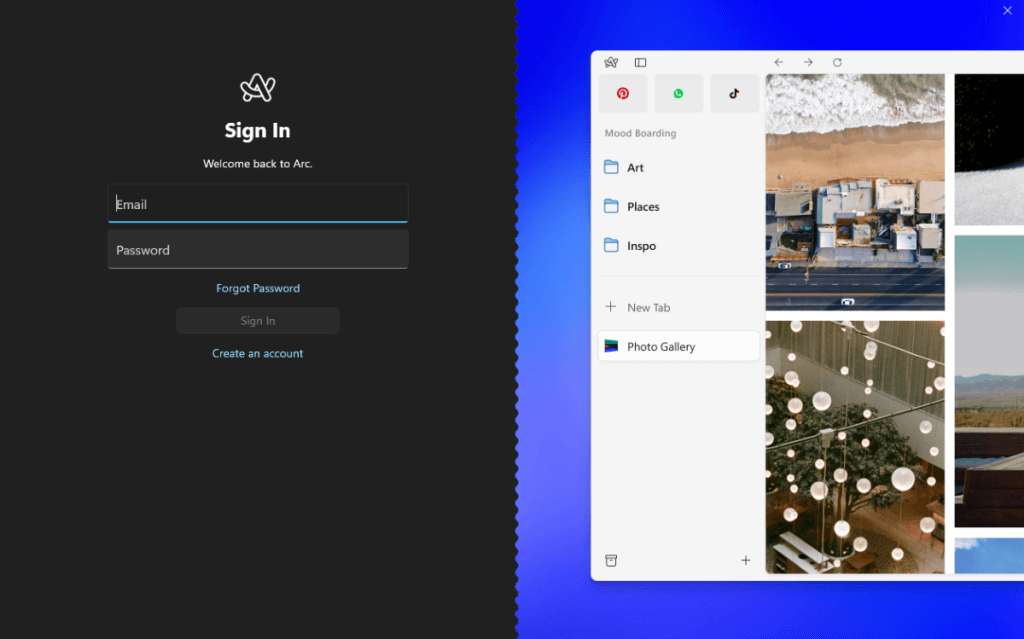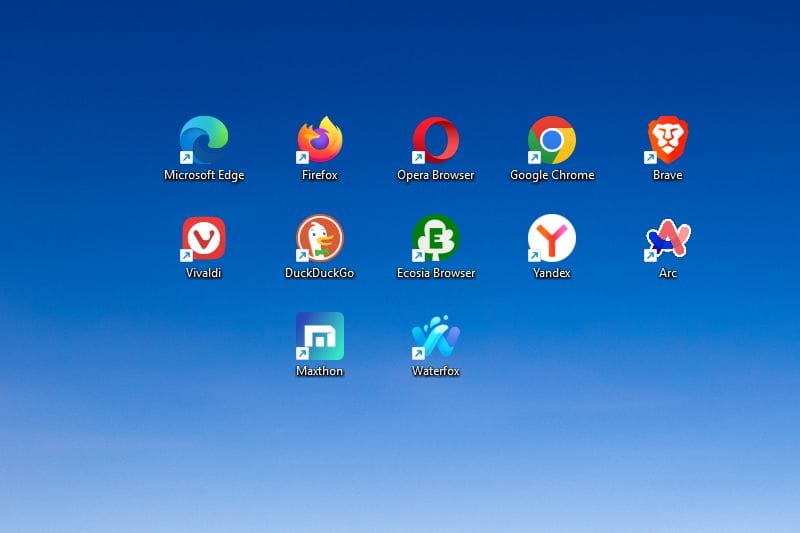Is your browser eating too much RAM?
We tested them all in 2026. →See the full results here
Which is the fastest desktop browser in 2025? We tested 11 of the most popular browsers under identical conditions, using eight independent benchmarks that measure speed, graphics performance, and responsiveness. This is our most comprehensive desktop browser comparison to date — and the results might surprise you.
The 11 browsers were chosen starting from the most well-known and widely used, continuing with those that stand out through special features — let’s call them “challengers” — and ending with a few less-known but noteworthy browsers found online.
We only included browsers that:
- have a stable desktop version,
- can be officially downloaded worldwide, and
- offer an English-language interface.
The browsers tested were: Chrome, Edge, Firefox, Opera, Brave, Vivaldi, DuckDuckGo, Ecosia, Yandex, Maxthon, and Waterfox.
Whether you’re after raw performance, graphical rendering speed, or ultra-low response times in web apps, the answer is in the tables below.
🔧 The Fastest Browser in 2025 – How We Tested
All tests were conducted on a clean Windows 11 Pro installation, fully updated. The system ran on a Lenovo M720q mini PC, with the following specs: Intel Core i3-8100T processor, 8 GB RAM, and a Samsung 860 Evo SSD. To ensure a stable internet connection, the system was connected via Ethernet cable.
No software was installed on the test PC except the default Windows apps and the browsers being tested. After installing the OS, we ran Crapfixer, a utility that removes unnecessary features and optimizes system performance.
To keep things as objective as possible:
- Only one browser was run at a time, with a single tab open for each benchmark.
- The browser was restarted after every test.
- Each benchmark was run in its latest available version.
- Browsers were used with default settings, as they come after installation — no extensions or performance tweaks.
📊 Browser Speed Benchmarks
We selected 8 well-established web benchmarks to measure how the most popular browsers of 2025 perform across different aspects of speed and responsiveness. Each was run in its latest available version.
Basemark Web 3.0
A comprehensive general-performance test covering JavaScript processing, DOM manipulation, WebGL, Canvas, and even WebAssembly. The final score reflects real-world capability across modern web scenarios.
JetStream
Measures JavaScript engine performance in advanced scenarios, such as asynchronous code execution, data serialization, and access to complex data structures. Especially relevant for heavy web apps.
MotionMark 1.2
Focused on real-time graphical rendering, this benchmark uses intensive animations to evaluate how well a browser handles visual workloads. Excellent for testing WebGL and Canvas performance.
Speedometer 3.0
Simulates real user interactions with web apps (to-do lists, input fields, navigation) and measures how quickly the browser responds. It’s considered one of the most relevant benchmarks for user experience.
Kraken 1.1
Created by Mozilla, this test measures execution time for heavy tasks like audio decoding, JSON manipulation, and numeric data processing. Lower scores are better (measured in ms).
Octane
An older Google benchmark still in use today. It measures JavaScript performance across varied web scenarios. Even though it’s officially deprecated, it still offers useful insights.
BMark
An independent benchmark focused on DOM processing, CSS manipulation, and JavaScript execution. It also includes visual responsiveness and rendering tests.
SunSpider
One of the oldest JavaScript benchmarks, measuring execution times in milliseconds. Outdated but useful for historical context.
🧩 Raw Test Results
| Browser | Basemark | JetStream | MotionMark | Speedometer | Kraken | Octane | BMark | Sunspider |
|---|---|---|---|---|---|---|---|---|
| Edge | 699 | 166.69 | 814.23 | 12.3 | 855.2 | 42782 | 4506 | 84.7 |
| Firefox | 640 | 108.572 | 630.31 | 10.5 | 1370.7 | 23670 | 2466 | 89.7 |
| Opera | 666 | 157.03 | 636.09 | 10.06 | 903.8 | 42175 | 4030 | 148.7 |
| Chrome | 708 | 170.193 | 661.74 | 12.6 | 853.8 | 42799 | 3922 | 87.1 |
| Brave | 705 | 153.902 | 587.5 | 11.6 | 851.9 | 42451 | 4046 | 87.8 |
| Vivaldi | 737 | 160.169 | 647.85 | 11.3 | 885.5 | 42000 | 4070 | 161.4 |
| DuckDuckGo | 690 | 163.663 | 864.6 | 11.8 | 916 | 41546 | 4358 | 88.9 |
| Ecosia | 703 | 164.769 | 658.53 | 10 | 880.9 | 42031 | 3829 | 87.8 |
| Yandex | 683 | 163.82 | 752.5 | 9.98 | 906.8 | 42359 | 3852 | 173.2 |
| Maxthon | 671 | 156.482 | 657.72 | 10.3 | 943.3 | 40518 | 4043 | 98.2 |
| Waterfox | 568 | 99.607 | 664.28 | 9.21 | 1398.8 | 22694 | 2729 | 82.7 |
🥇 Which Browser Won Each Test?
| Benchmark | Browser | Score |
|---|---|---|
| Basemark | Vivaldi | 737 |
| JetStream | Chrome | 170,193 |
| MotionMark | DuckDuckGo | 864.6 |
| Speedometer | Chrome | 12.6 |
| Kraken | Brave | 851.9 ms |
| Octane | Chrome | 42799 |
| BMark | Edge | 4506 |
| Sunspider | Waterfox | 82.7 ms |
⚙️ How We Calculated the Final Score – “Gadgetisimo Points”
To fairly compare all browsers, we created a unified score called Gadgetisimo Points. It normalizes results across benchmarks (some produce higher-is-better scores, others lower-is-better times) into a single value out of 100.
- For tests where a higher score is better:
- Normalized score = (Browser score / Maximum score obtained) × 100
- For tests where a lower score is better (ms):
- Normalized score = (Minimum score obtained / Browser score) × 100
- Final “Gadgetisimo Points” score:
- Arithmetic mean of all 8 normalized scores
The Fastest Browser in 2025 – Gadgetisimo Final Ranking
| Rank | Browser | Gadgetisimo Points |
|---|---|---|
| 1 | Edge | 97.724009051849 |
| 2 | DuckDuckGo | 95.406584418553 |
| 3 | Chrome | 94.29594493457 |
| 4 | Brave | 91.158702341081 |
| 5 | Ecosia | 90.226384894068 |
| 6 | Maxthon | 87.466072145645 |
| 7 | Vivaldi | 86.828149603525 |
| 8 | Yandex | 85.165151340804 |
| 9 | Opera | 84.236892203427 |
| 10 | Firefox | 71.405780315318 |
| 11 | Waterfox | 70.001468619755 |
💬 Additional Notes
Although this wasn’t a full review, several interesting observations came up during testing:
- Ecosia and Yandex automatically set themselves to launch on Windows startup. As soon as you log in, they open on the screen — an intrusive behavior, in my opinion. Yandex displays a prompt allowing you to disable this on first launch, but Ecosia requires manually changing a setting.
- We started with 12 browsers, but ended up testing only 11. Arc Browser doesn’t allow normal browsing without signing in — you’re immediately faced with a login/create account screen and can’t bypass it. While browsers like Edge or Chrome also encourage signing in, they’re not nearly as forceful. Because of that, Arc was excluded.
- Octane and SunSpider are technically outdated benchmarks, but we included them for historical context and comparison with older data.
- In general, all browsers were fast and responsive during testing, with two exceptions:
- Waterfox — some tests took visibly longer to complete than in other browsers.
- Maxthon — at times, after closing and reopening quickly, it lagged several seconds before starting up.

🧭 Conclusion
Google Chrome dominated several individual scores, but Microsoft Edge ultimately took the crown in this comparative browser test thanks to its consistent performance across all benchmarks. Microsoft clearly did its homework when it comes to optimization and speed — the Chrome vs. Edge battle in 2025 was close, but Edge pulled ahead.
If the top two spots aren’t surprising — given their dominance in desktop usage — DuckDuckGo was without a doubt the dark horse of this benchmark, managing to outperform established rivals like Firefox and Opera.
Firefox, in particular, disappointed in raw speed, taking it out of the race for the title of fastest browser in 2025. That said, it will likely remain a favorite for many users thanks to its other strengths.

